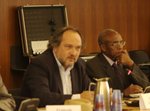Vincent LURQUIN
contribution 11 -
Lurquin Vincent

transtlated version
Thank you, Mr. President.
Well, I want to take the floor because I don’t want the Prosecutors to get used to speaking alone without the lawyers responding. I will be brief because we do agree on what Mr. Reyntjens has said. I will not go back to it.
I want to raise a semantic problem. Some of the Prosecutors talked about the investigations difficulties and others raised the issue of policy. But can one talk about investigations and policy at the same time?
Regarding the prosecution theory, I believe Mr Karegyesa will recall that the first person he gave me in the Bagambiki case was an investigator called Mr. Paul Dorbie. On 18th September 2000, the first day of the trial, he told us how the Prosecution used to work.
He told us the following: “First, investigations had been conducted on the ground. Secondly, we realised that it was the same thing always. Third point, and lastly, we did joint trials because we told ourselves that there was always a minister, the head of a civil defence group, an Interahamwe and a military commander.” Thus, in the Cyangugu trial, you found out a military officer, a préfet, a ministre and indeed an Interhamwe leader.
So what does this mean? Ms. Arbia said it clearly. She said that at some point there was a problem between investigation and Prosecution.
We did arrest people not because we had evidence or even prima facie evidence, but more because of their position. We arrested them first and then we told ourselves: we will try not to give evidence to the truth, but to give evidence to their guilt.
And I believe that one of the problems that we had in this Tribunal was that we moved from the investigation to the policy, but we could not combine both. And it also raised problems with regard to the indictment. How do you expect to have a precise indictment when the investigation comes after the preparation of the indictment, after the arrest of the suspect?
So, regarding what was said earlier on the issue of Rwanda, that ultimately we moved to the policy without investigation, it is because when one investigates, one investigates all over the country in relation to the temporal jurisdiction. We do not investigate closing our eyes to part of the crimes which were apparently established. And the only way to prevent the RPF from coming before the Tribunal was to say that it did not fit with our understanding of the conflict. Our understanding was to establish the good and that bad, and I hope not, the Tutsis and the Hutus.
I believe such a problem contaminated the Tribunal and also led to some acquittals in that respect. But I believe that the essential penal issue is to search for the truth and not to substitute a policy for reality.
I think that too has been said. And I believe that the Honourable Judges were somehow taken hostage. I believe that on the day of the initial appearance the Judges may have told themselves that this time they may have somebody from the other side, from the victor’s side so that it can be said that justice has been delivered, rendered, not only to the victors.
J.P. GETTI
I don’t know who wants to take the floor precisely. Kwende, Mr. Kwende, please. You have asked to take the floor, please.

